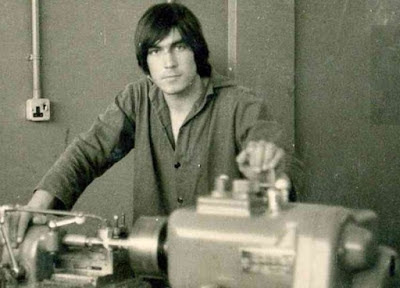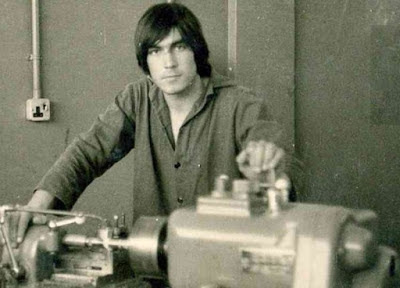On November 15, 2008, the Municipality of Aglantzia held a Political Memorial in Memory of IAKOVOS KOUMIS. From that event we draw today, the day of remembrance of Iaxovos Koumis, the speech of THEKLAS KITTOU, in which the Cypriot director gives the message of great sacrifice, but also lays down the tragedy of a generation.
By Thekla Kittou:
"The initiative we took tonight, as AEIPOLIS Speech and Art Center, responds to an internal need of my own generation, the generation we used to call: the Polytechnic generation. This same generation was the generation of the Turkish invasion of Cyprus. It is also the generation that, while it should have, could not stop the catastrophe for our country, on the contrary, it sank itself into decline and decay. Tonight owes three debts:
A: The debt to those of our generation, Cypriots and Greeks, who gave their lives in the resistance against the 1967 junta
B: The debt to those of our generation, Cypriots and Greeks, who fell in the struggle for the defense of Cypriot Freedom in 1974
C: The debt to the Cypriot patriot Iakovos Koumis who, continuing an ancient tradition, gave his life in the joint Greek-Cypriot struggle
There were many Cypriots who, as young people, mainly students, found themselves in the Greece of the colonels. We matured in the dictatorship and learned what FREEDOM means and each of us contributed to the struggle, according to his mental and spiritual strength. At the time of the Popular Uprising, which was to be combined with the betrayal of Cyprus, of the Polytechnic Uprising, we were there again. There were many, many Cypriots who took part in the occupation and the mental ties that developed in those days kept us alive, when the prisons were filled again and when the junta soon carried out its last and most macabre task: to hand over Cyprus to the Turks. .
It is very difficult for the current young generation of Cypriots to understand the mental trauma, the emotional void and the spiritual chaos in which our historical fate had pushed us. In front of our infinite eyes, our young state, only fourteen years old, was destroyed. We were young. Left or right, greedy or blissful, nationalists or internationalists. National humiliation and agony settled in our souls. Our lives became poor and miserable overnight.
Then, in the autumn of 1974, in the explosive atmosphere of bloody Cyprus, and while Athens was rejoicing in its liberation without realizing the weight of the price paid by the Cypriots, some fifty young people, mainly competitors from the Polytechnic, founded EPITROPHI. We then met with one of the three speakers of the Polytechnic, Lambros Papadimitrakis, in Germany to shed light on the Cyprus issue. Student gatherings, thousands of participants. Greek and Cypriot students, agony and a stifling atmosphere. Proclamations, complaints, protests. There in Munich, we met Adamos Kaikkis from Sotira Famagusta. Initiated in the Resistance.
With a three-month-old baby in our arms, with the camera on our shoulder, we set foot in Cyprus, which was bursting. We ran everywhere. Thousands of meters of film. It was for the movie CYPRUS THE OTHER REALITY. Political rallies. Every day. We met people, a lot of people, mostly young people. In Sotira, Adamos had told us, to find my sister Maria.
Maria is very young. A beautiful dark tall girl full of vigor. She knows our boy, Iakovos. A nice boy with wonderful eyes. She teaches Greek dances. They joined our company. Together we founded TA OCTOBER, the historic bookstore we christened in honor of the anti-colonial uprising of the '31 generation. Separate companions both. At their wedding, a wonderful Cypriot wedding, the whole company went.
Later, the newlyweds left for Athens for Studies, September 1980. We said goodbye to them at the ELDYK dance, next to the bookstore. James that night danced like "an eagle without wings". No one has ever danced zeibek like him. This ancient Greek rhythm shocked his whole being… ..
…. In Athens, Iakovos actively participates in anti-imperialist mobilizations. It is only 6 years since the invasion of Cyprus and the then Greek Government of Georgios Rallis, decides to rejoin Greece in NATO. The country is rocked by mass mobilizations and clashes with repressive forces. On Sunday, November 16, on the eve of the Anniversary of the Popular Uprising of the Polytechnic, Athens vibrates from the great anti-Oriental March to the American Embassy, with main slogans against Greece's reintegration into NATO and against the Turkish occupation of Cyprus. Iakovos Koumis participates in the march. In Syntagma Square, he becomes the victim of a savage attack by MAT, which leaves him seriously injured on the spot. MAT's organs, a few minutes later, leave the worker Stamatina Kanellopoulou dead on the spot. Iakovos is transported to the People's Hospital and on Sunday night he is already clinically dead.
Here in Cyprus we learned that there were injured. We did not imagine, not even a suspicion. Early Monday morning, I am at the Square stand to learn more news. In the newspaper, top right, a photo of a human head almost melted. unknown. And suddenly below the name of our partner: IAKOVOS KOUMIS from Cyprus… On Sunday, November 23, he leaves his last breath to Laiko.
On Thursday, November 27, his body is transported to his birthplace, Sotira, for a popular pilgrimage. He is buried on Friday morning, November 28. The next day, in a charged atmosphere, a trisagion is performed at the Holy Temple of Faneromeni in Nicosia and a procession to the Greek Embassy follows.
Iakovos Koumis, during his short passage from the national liberation movement, has left us as a legacy two things: the militant ethos of an innocent youth and remarkable writings of the soul from his personal notebooks. His texts are of two kinds: diary and poems. Both men and women are not characterized by a solid spiritual direction, of which the liberating ideology, social and national, is the source. It is surprising that his intense personal lyricism always remains critical and political. From these texts, an anthology was made by Loukas Axelos in issue 5 of the magazine TETRADIA POLITICAL DIALOGUE OF RESEARCH AND CRITICISM, in July 1982.
His untimely demise inspired poets, both in Cyprus and in Greece, who left us excellent lyrics. We mention Lefkios Zafeiriou, Costas Makridis, Areti Athanassiou. Finally, we must refer to the extremely sensitive and intelligent short story of Maria's wife entitled: TODAY I AM STAMATINA, published in the Athenian ELEFTHEROTYPIA on November 15, 1981.
The sacrifice of Iakovos is the sacrifice of another Cypriot, in the million sacrifices that the Cypriot Hellenism gave for the national and social liberation of the common homeland. Iakovos was, in modern times, the only Cypriot fighter who fell in the struggle against the regime of foreign dependence of the Greek Nation. Next to LAMBRAKIS, PETROULAS, MANDILARAS, TSAROUCHAS, PANAGOULIS, KANELLOPOULOU.
IAKOVOS KOUMIS is the last Cypriot patriot who offered his life in the joint Greece-Cyprus match. "

